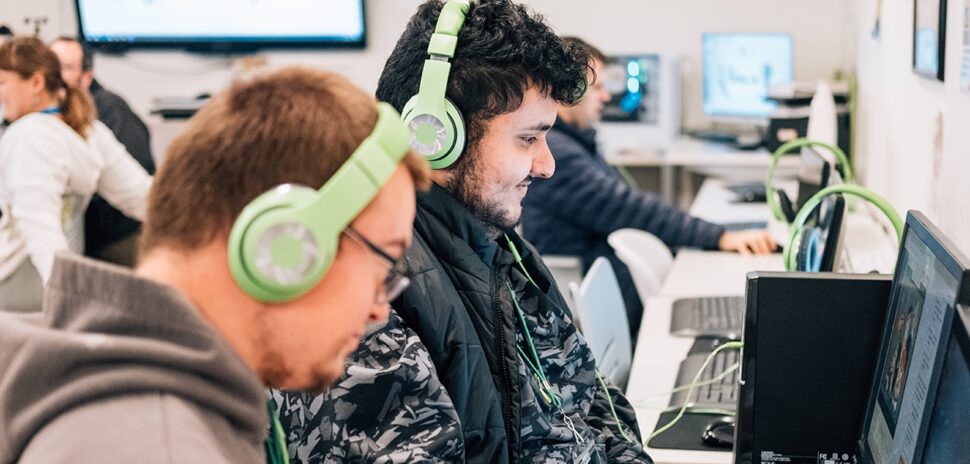The college admissions system is often access-oriented, geared toward pulling young students in, whether they have the academic or financial resources or not, leaving them tens of thousands of dollars in debt — often without the degrees they sought.
A Dallas-based nonprofit mentoring/scholarship program called ScholarShot is shaking up that dynamic by helping low-income prospective college students by:
- changing lives with college degrees and vocational training;
- shoring up neighborhood economies by helping that area’s college-age population make the right educational choices, so they can earn their degrees, and land well-paying jobs;
- focusing especially on first-generation college students; and
- gauging prospective students’ determination to complete the degree or certification they sought and offering scholarships to those who do.
ScholarShot Executive Director Dan Hooper said high school guidance counselors often encourage students to apply to multiple colleges, without considering student goals or their financial situations. The non-profit’s goal is to shore up communities by helping that area’s college-age population make the right educational choices, so they can earn their degrees, and resulting compensation.

ScholarShot scholarship recipient Estefania Alcantar was graduated from Texas A&M.
“High schools (have them) apply to the most number of schools, so they can talk about the scholarship dollars their students got,” said Hooper. “No one is asking the question of whether this man or woman can get bus fare for that school,” he said. “Nobody questions, ‘Should you go there?’“
The result is that instead of graduating professionals ready to take on their industries, the system is producing debt-laden young people who might or might not have their degrees.
“We manage and monitor students who graduate with less than a fifth of state average debt,” Hooper said. “They won’t start their lives as a victim of the college system, in a subprime market.”
In contrast, Hooper and others at ScholarShot sit down with prospective students and ask hard financial questions, suggest alternative means of funding (whether there are scholarships or grants available), and explore whether local, affordable schools could provide them the educations they need to realize their goals. They’re encouraged to attend community colleges to obtain core credits and to pursue advanced courses at four-year institutions.
Students in the program are awarded up to $6,000 in scholarships annually; they can spend the money at their discretion.
“They’re not distracted, and they don’t have to work extra hours” for tuition money, Hooper said. “The real difference maker is that hands-on academic guidance, and coaching and counseling they get.”
Currently, ScholarShot has 103 active scholars; 46 of them are from the Southern Dallas region. Alma maters of past ScholarShot graduates include Texas Woman’s University; Texas State University at San Marcos; University North Texas-Dallas and Denton; University of Texas-Arlington, Austin, and Dallas; and schools in the Dallas County Community College District.
ScholarShot is far from a benevolent ATM for prospective first-generation Texas college students.
Before awarding prospective students any scholarship money, it gauges prospective students for their grit. In other words, how badly do they want a degree?
“The ‘grit factor’ indicates an awareness of the value of getting a post-secondary credential,” said Hooper, adding that such students look at their degrees as integral in pursuing their careers, and as a means of giving back to their families.
Hooper says some students who were lower academic performers in high school prove to have the most heart and fortitude when they face adversity.
But how does ScholarShot determine a student’s grit?
“It’s determined in face-to-face interviews, and in essays in which we ask them to describe struggles that they’ve overcome, and how they see the value of earning a degree,” Hooper said.
Students also must submit hand-written essays, to help ScholarShot verify that they’ve been written by the applicants.
One product of the ScholarShot system is Mayra Romero, 23, who now lives in Lancaster. Romero spent most of her childhood in West Dallas, attending the now-shuttered George Washington Carver elementary school. That school was located in the highest concentration of poverty in Dallas Independent School District, according to the Dallas Morning News.
Romero said ScholarShot gave her the structure and accountability she needed to obtain a four-year food science degree from Texas Woman’s University. She would report her academic progress to her counselors at ScholarShot biweekly, and consult with them periodically with questions. ScholarShot students also agree to allow the organization access to their financial information.
“ScholarShot isn’t like a typical scholarship,” she said. “Anytime I had issues in the class, and didn’t know what to do, they were able to give you counseling.”
Romero recalls when she fell ill during a semester, and ScholarShot’s staff helped counsel her through an illness, which threatened her grades. ScholarShot mentors helped her weigh her decision in whether she should drop the class or soldier on, she said.
Now, Romero works for Borden in the Dallas region, as a replenishment analyst, placing orders for Borden products on behalf of nationwide retailers such as Wal-Mart and CVS.
Hooper said ScholarShot’s program is paying off for students.
“We have over a 90 percent completion rate for our scholars to finish vocational, associate or undergraduate degrees in one, three or five years respectively, AND, with less than 1/5th the state’s average in debt,” Hooper wrote in an email to GrowSouth. “This completion rate and low debt are our key differentiators.”
ScholarShot partners include AT&T, Dallas Mayor Mike Rawlings’ GrowSouth initiative, Café Momentum, CBRE, The Real Estate Council, Big Brothers Big Sisters of America, HEB, and The Meadows Foundation.
![]()
Get on the list.
Sign up to keep your eye on what’s new and next in Dallas-Fort Worth, every day.






























